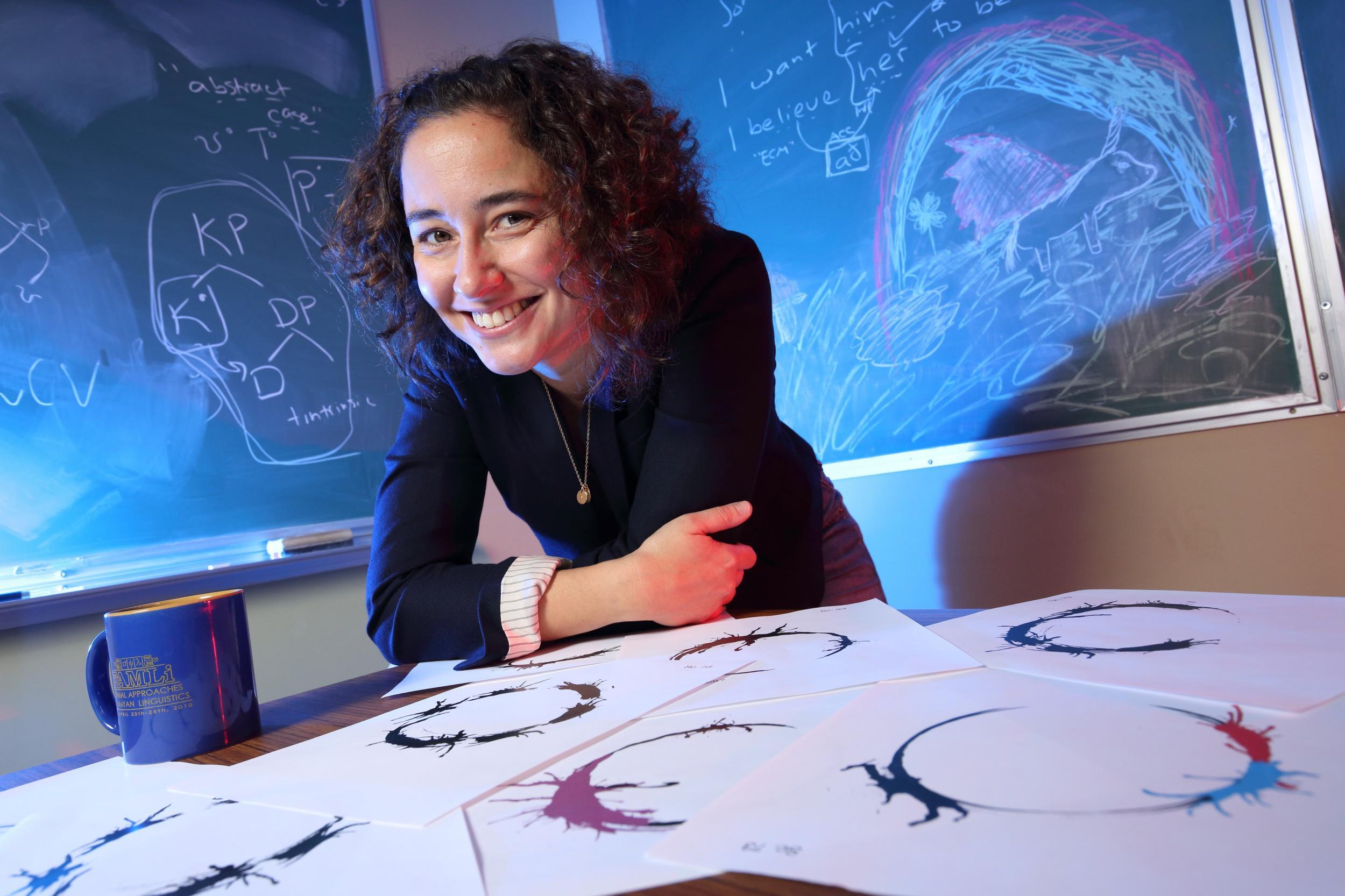Arrival: Linguist behind film talks speaking to aliens and how Donald Trump is affecting language
Jessica Coon discusses how humans would make contact with extraterrestrials, whether emoji can replace written words and how the internet is putting some languages at risk

Your support helps us to tell the story
From reproductive rights to climate change to Big Tech, The Independent is on the ground when the story is developing. Whether it's investigating the financials of Elon Musk's pro-Trump PAC or producing our latest documentary, 'The A Word', which shines a light on the American women fighting for reproductive rights, we know how important it is to parse out the facts from the messaging.
At such a critical moment in US history, we need reporters on the ground. Your donation allows us to keep sending journalists to speak to both sides of the story.
The Independent is trusted by Americans across the entire political spectrum. And unlike many other quality news outlets, we choose not to lock Americans out of our reporting and analysis with paywalls. We believe quality journalism should be available to everyone, paid for by those who can afford it.
Your support makes all the difference.When it comes to the Best Picture category, the Oscars often ignore science-fiction. Yet, last year, the academy made an exception as Denis Villeneuve’s Arrival was nominated thanks to its complex story, superb choreography and wonderful leading character, Louise Banks, played by the ever-brilliant Amy Adams. (While the “thinking man’s Independence Day” lost to Moonlight for Best Picture, Arrival managed to bag Best Sound Editing, besting the night’s big winner, La La Land.)
In the film – an adaptation of a short story by Ted Chiang, Story of Your Life – Earth is visited by extraterrestrials, known by humans as “heptapods”. They appear in huge, black spacecraft and, although they don’t attack mankind, various leaders of the world view them as a threat. Unable to communicate with the aliens, Dr Banks, a linguistics teacher, is employed by the US army to translate their language into English.
Jessica Coon, an associate professor in the Department of Linguistics at McGill University, Montreal, acted as a consultant on Arrival, helping Villeneuve and Adams accurately bring Dr Banks to life. As well as providing pointers to what the character’s office would look like, Coon looked over the film’s script, discussing with the filmmakers how a linguist – a person who studies linguistics, defined as “the scientific study of human language” – would go about communicating with an alien life form.
“There were a lot of things the film got really right when it comes to doing fieldwork,” Coon says. “Earlier on in the film, she’s the first person to take off her helmet and really try to interact with the heptapods in a meaningful way. As linguists, we’re interested in the more abstract properties of languages, but you can’t get at those directly. You have to interact with speakers of those languages, whether that be human language or alien languages.”
Another prominent point the filmmakers get right is how Banks asks simple questions at first, rather than complex. “You have to understand the smaller parts first because there’s so much room for miscommunication and certainly – in this case – the stakes are very high. You want to make sure you understand what’s being communicated, and what the possible ambiguities are.”
In many ways, Coon explains, the way Banks translates the alien language is similar to how we would translate another human language into our own. First, you have to establish that both parties are trying to communicate with each other. One starting point is then looking at common objects and attempting to interpret how each group communicates what that thing is. For instance, the scientists in Arrival names the two heptapods Abbott and Costello. After learning how the aliens say these, Banks can act out walking and get the sentence “Costello is walking” from them. By taking away the known word for “Costello”, the scientists can work out the action itself.
While building from simple to complex sentences is a tactic used when communicating between unknown languages, when it comes to human languages we have a huge head start. “Human languages share certain things in common," Coon says. "We know how to find certain patterns, and when we find one common property we are able to find others. Human language seems to be very directly linked to other more general aspects of human cognition."
“Humans are born ready to learn human languages and humans can do this effortlessly. When it comes to alien languages, we do not have this luxury. It would be very surprising, actually, if they were similar-to-human language because, really, human languages are directly tied to out genes – to our humanness – and so we can expect alien languages to differ hugely from our own.”
This directly ties into a leading theory within the study of linguistics: universal grammar. Often credited to Noam Chomsky, the idea postulates how human language is innately tied to what makes us human; that whatever the case, humans will develop languages that share certain properties. “Toddlers are very bad at doing basic things like tying their shoes or adding numbers,” Coon says. “But they learn very complicated linguistic decisions effortlessly.”

Watch Apple TV+ free for 7 days
New subscribers only. £8.99/mo. after free trial. Plan auto-renews until cancelled

Watch Apple TV+ free for 7 days
New subscribers only. £8.99/mo. after free trial. Plan auto-renews until cancelled
What of the evolution of language? Have these innate properties we pick up effortlessly as toddlers changed over time? “Languages, of course, change over time – we don’t speak Latin anymore – but they don’t change in any qualitative way. There’s no evidence language is improving in any meaningful way. People talk about human languages evolving, but really they’re just changing. At least, as far as we have any record of, human languages share fundamental properties.”

Talking about changes is language, one subject long brought up in English classes is how Shakespeare helped form our modern language. At the risk of sounding ridiculous, I bring up Donald Trump and his peculiar way of talking – using words such as “bigly”. Could we be witnessing another large change in the English language?
“Linguists have done some analysis of Trump’s style of speaking and his tendency to say very short phrases: there do seem to be some peculiarities with the way he speaks,” Coon says. “In terms of words, maybe. New words are introduced into our language all the time.”
While Trump “might be a special case” and “there are some very interesting linguistic challenges to his speech,” Coon says there’s “no such thing as people speaking a worse language or a language being qualitatively worse or better than another. They’re just different and there are speakers of one language who might have feelings about another, but they are just feelings and often come from our stereotypes of people who speak these languages.”
Another interesting idea researched by some linguists is the growing use of emoji. However, while older generations may worry about the symbols becoming part of our everyday language, there’s no chance of those symbols ever replacing our vocabulary completely. “Any human language can express an infinite number of things," she says. "With emoji, you don’t have the same kind of complexity of expression. You’re fairly constrained in what you can do."
“My understanding is that there’s a consortium of people who decide what emoji can be used, and that’s not how human language works. For example, Trump’s use of the word ‘bigly’. People can say whatever they want and if it catches on it catches on. With emoji you have to lobby a consortium to get one working.”
Linguists may not be worried about emoji replacing words, they are nervous about the internet's huge impact on language. Despite the world wide web bringing researchers from across the world together, now is actually a time in history where linguists are most worried about the future of languages.
Coon explains how, while “English may be in no danger of being replaced by emoji, there are more than 6,000 languages being spoken and a very large percentage – between 50 and 90 per cent – are no longer likely to be spoken in the next 100 years unless something drastic happens to reverse this. Many languages which are in critical danger are only spoken by elderly people and when they die the language is gone.”
Because the likes of English, Spanish and Mandarin are becoming so widely spoken, speakers of lesser known dialects are less inclined to impart that knowledge to future generations. Linguists are worried from both a scientific and cultural viewpoint about this phenomena.
“From a scientific perspective, if our goal as linguists is to work out how human languages work, we’re not doing very good science if we only look at a handful of closely related European languages. Culturally, there are communities where the language carries their identity. A lot of cultural information can be lost when these are lost. For example, many languages have words for different medicinal plants that a majority language, like English or French, may not have. A lot of studies have shown that the health of a community’s indigenous language correlates to a lot of other health and wellness factors.”
While it’s a critical period for languages and linguistics, films such as Arrival, Coon says, will hopefully get people interested in the subject before it’s too late. “To get started, all you need is access to a speaker of the language you’re interested in working on,” she says. “Taking classes or becoming educated about the huge amounts of diversity that comes from human languages or understanding how human languages are all equally expressive and carry lots of value, those are all things that will hopefully come out of this film.”
Arrival is out now on DVD and Blu-Ray
Join our commenting forum
Join thought-provoking conversations, follow other Independent readers and see their replies
Comments